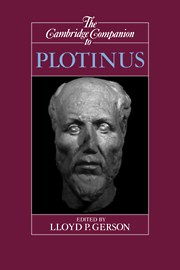Book contents
- Frontmatter
- Introduction
- 1 Plotinus
- 2 Plotinus's metaphysics of the One
- 3 The hierarchical ordering of reality in Plotinus
- 4 On soul and intellect
- 5 Essence and existence in the Enneads
- 6 Plotinus on the nature of physical reality
- 7 Plotinus on matter and evil
- 8 Eternity and time
- 9 Cognition and its object
- 10 Self-knowledge and subjectivity in the Enneads
- 11 Plotinus
- 12 Human freedom in the thought of Plotinus
- 13 An ethic for the late antique sage
- 14 Plotinus and language
- 15 Plotinus and later Platonic philosophers on the causality of the First Principle
- 16 Plotinus and Christian philosophy
- Bibliography
- Index
14 - Plotinus and language
Published online by Cambridge University Press: 28 May 2006
- Frontmatter
- Introduction
- 1 Plotinus
- 2 Plotinus's metaphysics of the One
- 3 The hierarchical ordering of reality in Plotinus
- 4 On soul and intellect
- 5 Essence and existence in the Enneads
- 6 Plotinus on the nature of physical reality
- 7 Plotinus on matter and evil
- 8 Eternity and time
- 9 Cognition and its object
- 10 Self-knowledge and subjectivity in the Enneads
- 11 Plotinus
- 12 Human freedom in the thought of Plotinus
- 13 An ethic for the late antique sage
- 14 Plotinus and language
- 15 Plotinus and later Platonic philosophers on the causality of the First Principle
- 16 Plotinus and Christian philosophy
- Bibliography
- Index
Summary
Plotinus's highest metaphysical principle, the One or Good, is ineffable (V.3.13.1; cf. V.3.14.1-8; V.5.6.11-13; VI.9.5.31-2). Indeed, Plotinus is hesitant to attribute “good,” “is” (VI7.38.1-2), or even “one” (VI.9.5.30-3) to it. If the heart of his philosophical enterprise is to make meaningful statements about this principle, and furthermore our understanding of all else is informed by it, we may well ask why, in the light of this apparent despair of language, he would continue in his quest (his work extends to nine hundred and seventy-four pages of Oxford text).
Of course, in saying that the One is ineffable, Plotinus has already made a statement, albeit negative, about the One. So at least this negative statement is permissible. Further examination of the possibilities of negative language offers more fruitful ways out of the closure apparently imposed by the stricture of ineffability. Before we consider further the question of the One's ineffability, it will be useful to examine the uses that Plotinus makes of negation. Plotinus uses negation to avoid confusion of an incorporeal reality accessible only to the mind or spirit with a corporeal reality perceived by our senses.
- Type
- Chapter
- Information
- The Cambridge Companion to Plotinus , pp. 336 - 355Publisher: Cambridge University PressPrint publication year: 1996
- 9
- Cited by

